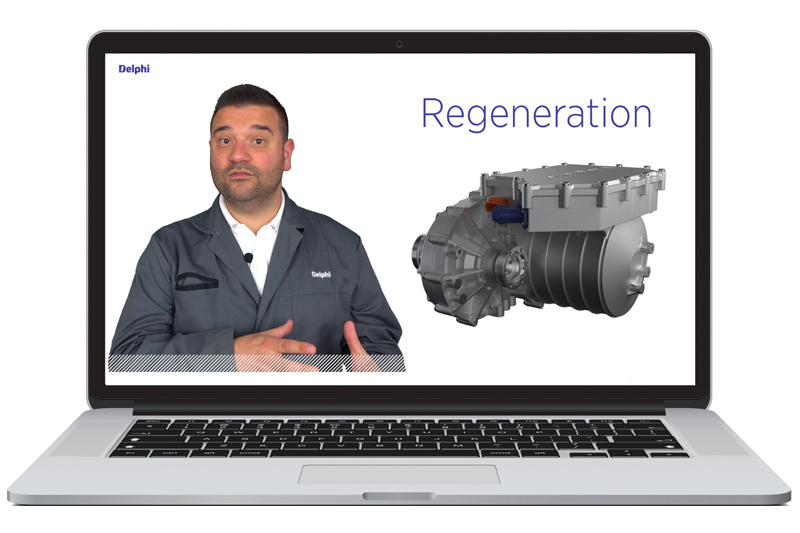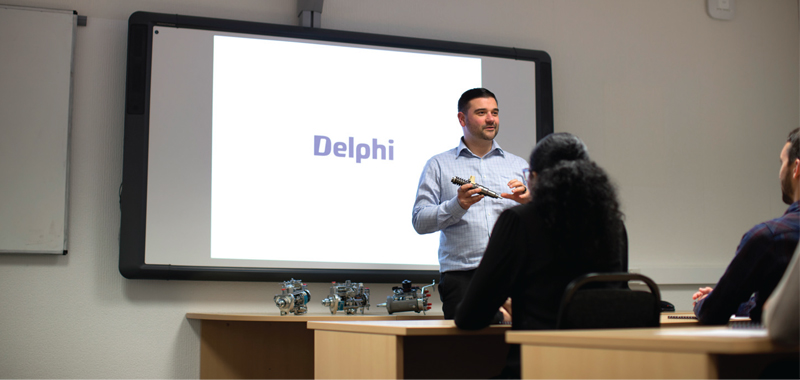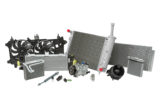
Delphi is seeing ever more technicians interested in its EV training offering and has increased its focus on that complicated colossus of the battery-powered world: Tesla.
Delphi offers face-to-face training from its Titan 10 facility in Warwick. The focus is on future technology with vehicles, service equipment and test rigs available for technicians seeking ‘hands on’ experience.
Nearly three quarters of delegates attending the training courses are following a defined CPD training pathway, mapped to industry-recognised IMI qualifications. Available paths include IMI service, fast- fit, service/diagnostic and master technician assessments. Each of the pathways provides between four and seven modules which are one or two days in duration. IMI accreditation is then dependent upon completing an additional assessment day afterwards.
The Delphi Academy gives a convenient way to enhance skills and knowledge without the challenges of attending physical training. There’s a training needs assessment which includes a series of questionnaires and online ‘practicals’ before suggesting modules to complete tailored to that user. Hybrid and electric vehicle training is the perfect example of the benefits of a true blended learning experience.
For the more advanced EV course we provide six hours of online pre-learning on electrical systems to try and get the foundation knowledge of electrical principle to then build upon in the training centre.
Delphi’s combined e-learning offering comprises 16 courses on vehicle electrics, hybrid and EV alone. In all, there’s a total of over 100 modules varying in length from a couple of minutes to nearly an hour each.

EV training growth
Four of the five most popular training courses relate to EVs and hybrids, perhaps not surprising given how registrations of electric vehicles are surging. According to SMMT figures, 2022 saw UK registrations of hybrid and EV cars exceeding the combined volume of petrol and diesel engine cars for the first time.
Delphi’s one day hybrid and electric vehicle level 3 course is designed to support technicians to work safely on high voltage systems, as well as petrol and diesel hybrid systems.
This would enable a technician to disable and power up the high voltage system safely to change components. All its EV training carries IMI TechSafe recognition too, demonstrating they are fully prepared to be working on EV.
Beyond this, there’s a two day level 4 course which covers diagnostics. With the power off, fault finding can be difficult so this course goes much more deeply into diagnosing live high voltage systems including high voltage battery repairs from different manufacturers.
Tesla suspension repairs
For those garages opting to get involved with EV repairs now, Tesla work can often form a surprisingly large part of the requirement.
Delphi has recently investigated a recurrent issue on the suspension system of the Tesla Model S. A Tesla technical service bulletin (TSB) relating to this fault (SB-17- 31-006) stated: ‘some Model S and Model X vehicles might have been manufactured with front suspension lower fore links that do not conform to Tesla’s subjective specifications for strength. In the event of link failure, the tyre might contact the wheel arch liner, but the driver can still maintain control of the vehicle.’
Earlier this year, to support aftermarket repair solutions, Delphi added a complete front suspension solution for the Tesla model S to the range, including all upper arms, lower arms, and anti-roll bar links.
Working with Tesla
Also in 2023, to coincide with the release of Tesla Model S and Model X coverage on Delphi’s BlueTech VCI diagnostic tool, an eleven-part course was added to the Delphi Training Academy. The course modules cover vehicle identification, data, and parts ordering as well as diagnostic hardware, connection, and common jobs.
“Everything is a little bit different when it comes to Tesla,” said Philip Mitchell, workshop solutions manager at Delphi. “But garages needn’t turn away these cars, they just need to understand how they’re different.”
Tesla’s browser-based diagnostic tool requires technicians to correctly configure a laptop or PC for vehicle connection. Further difficulties arise after successful connection as Tesla’s distinctive IT-based jargon used within the tool can be problematic. The new e-learning course includes step-by-step video guidance, walking technicians through what can otherwise be a frustrating and time-consuming diagnostic process.

“The first stumbling block workshops face is knowing exactly which model they’ve got,” said Philip. “Knowing if it’s a Model S or Model X isn’t enough because they all use different processors and the method of vehicle connection will depend on which processor it has.
“And then you’ll have to get through a layer of Microsoft security if you want to use Tesla’s browser-based diagnostic tool. Unless you correctly configure your computer beforehand, all vehicle communication will be blocked and you won’t be able to connect to the car.”
An exam completes the Tesla module with a Delphi certificate and IMI continuing professional development credit for those achieving a 70 per cent pass mark or higher. As with all Delphi Academy modules, the Tesla content is presented in a user-friendly format with multi-media learning methods including interactive technical articles, videos and simulators for all levels of ability.
Step-by-step Tesla repairs
Last but not least, Delphi’s ‘Masters of Motion’ hub – only launched at the start of this year – already provides ‘how to’ videos for specific Tesla repairs covering:
‘How to bed in the brakes on a Tesla Model S’ – Click here.
‘How to replace the upper arm on a Tesla Model S’ – Click here.
‘How to replace the front lower arms on a Tesla Model S’ – Click here.









